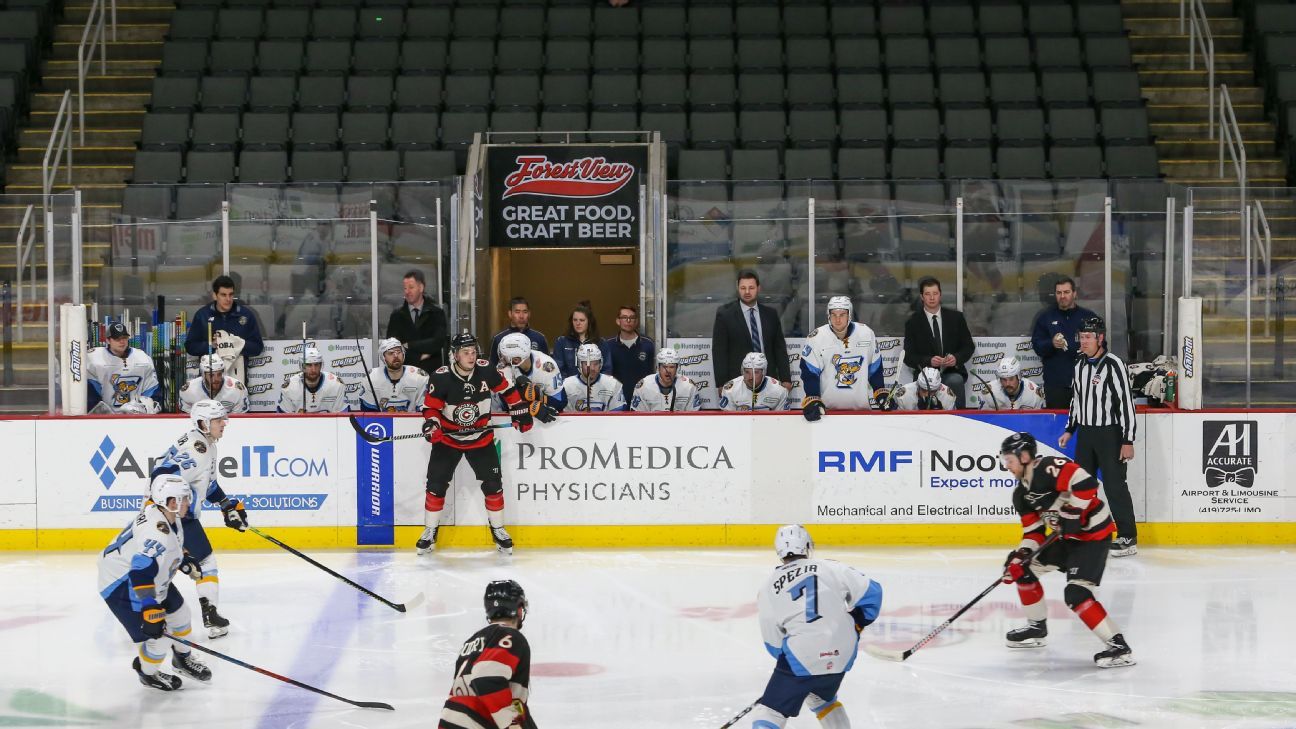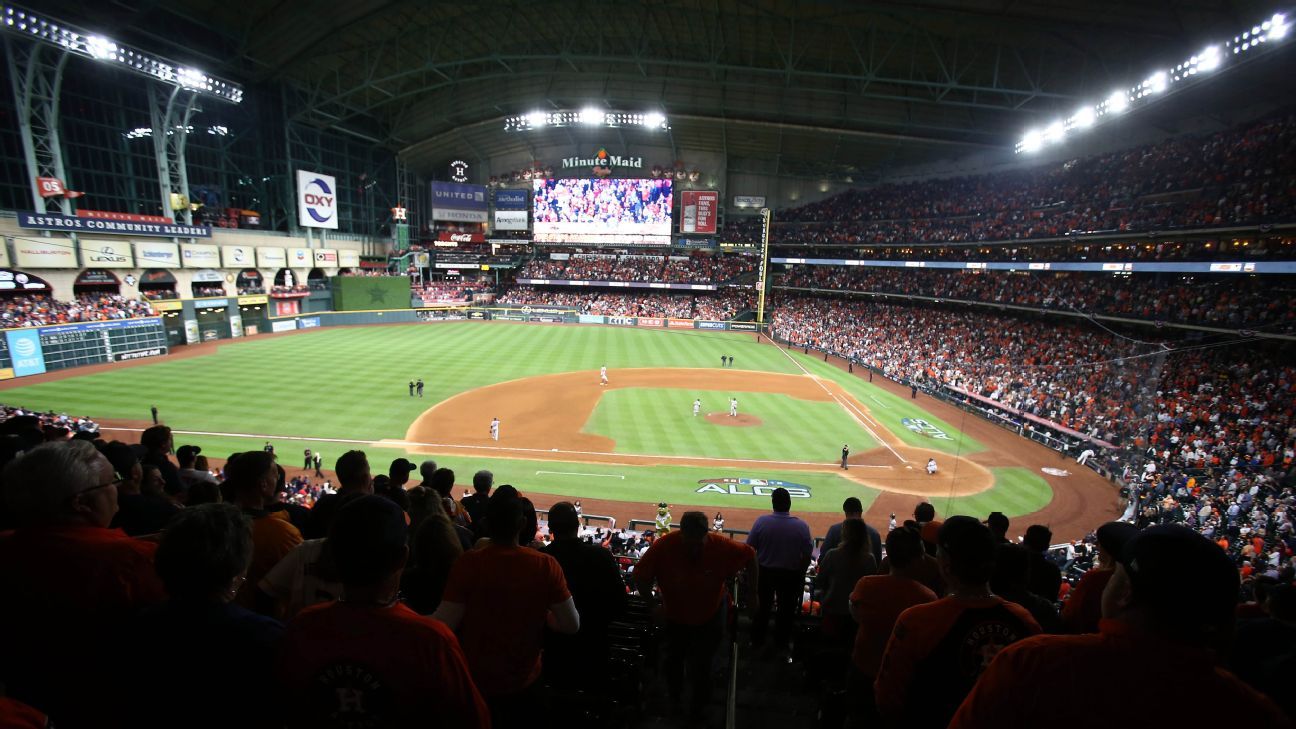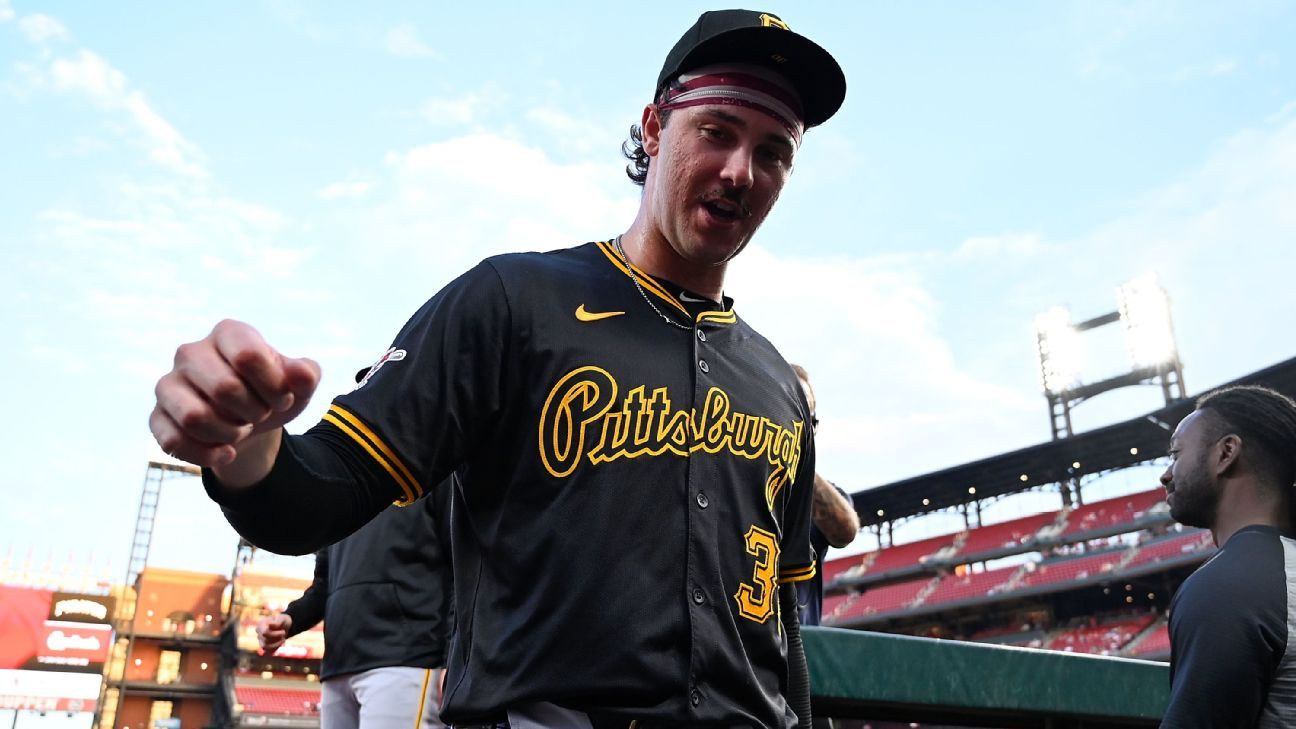
The National Hockey League has paused its season during the coronavirus pandemic, in the hopes of completing it months later. ECHL commissioner Ryan Crelin knew he didn't have that luxury.
His NHL-affiliated 26-team league, with franchises in 19 U.S. states and two Canadian provinces, canceled the rest of its regular season and its postseason on Sunday.
"It's not an easy decision. It's an excruciating and emotional decision," Crelin said. "But at the end of the day, I'm convinced it's the right decision."
Doug Price of the Southern Professional Hockey League canceled his season on Sunday, too. The SPHL has 10 franchises in eight states. Price proudly talks about how thrilling the 2019-20 campaign was for his league. About how two teams -- Peoria and Fayetteville -- were tied at the top of the standings, while the next four teams were separated by only two points.
These are now championship races without a finish line.
"It was going to be a fantastic end to the season," he said. "There's no playbook for this. Really, it's just making the best decisions, day to day. And keeping the public health interests at the forefront."
The NHL is a $5 billion industry unto itself, with television and sponsorship deals that will not only keep the lights on during this unprecedented international crisis, but that also fuel its desire to see the season to its conclusion. But the NHL is an outlier when it comes to pro hockey leagues and its reaction to the COVID-19 pandemic: From Europe to Asia to minor leagues in North America, these organizations have canceled their seasons after being unable to envision a path back from a "pause."
The financial impact on these leagues and its players is unfathomable at this point. There are too many variables, too many unknowns. But for the ECHL and the SPHL, there is a possibility that some of the teams that saw their seasons prematurely end in the last week might not be the teams that return to play next season.
"We are hopeful that everyone is going to return. We're in the very early stages of evaluating our fiscal status," said Price, when asked about teams potentially leaving the SPHL or franchises folding. "But as a league, we don't have the TV revenues or national corporate support that an NHL would have."
Crelin has also considered teams being unable to return to the ECHL. "Am I concerned? Yeah, sure. But I think that goes into our decision and why we did what we did. The impact is quite large. We had a number of teams that had six or seven home games left. Our model is predicated on fans. We don't have national TV deals. That's a significant hit, plus the loss of the playoffs as well," he said. "Sure, there's concern. But I think we took the prudent action. And we'll be working with all of our stakeholders to find a way to get through this."
Here's how these two leagues arrived at their decisions.
Early last week, Price began to hear the rumors. The coronavirus outbreak was forcing people to "socially distance" from one another, and in some cases local governments were stepping in to enforce restrictions on "mass gatherings" -- such as thousands of fans attending a hockey team's home game. Price began hearing that games in other leagues could be held in empty arenas.
He had a conference call last Tuesday with a select group of his governors, and they agreed to monitor the situation. Another call with the full board of governors was held Wednesday. "We got off that call and it was relatively normal," Price recalled.
Normal enough that he went out that night confident there could be a path forward for the SPHL.
Then he saw what was on the television.
"They had the NBA games on. You started to see news of the immediate and quick postponement of the first game, when [Utah Jazz player] Rudy Gobert was ill. Two hours later, it went from a game being canceled to the season on hold," Price said. "I knew at that moment that the call that we were going to have the following day ... the context of that call flipped 180 degrees. This was something bigger than we had anticipated even hours before."
The SPHL formally canceled its season Sunday, citing "state mandates already preventing multiple teams from playing until at least May 1 and the uncertainty surrounding what additional restrictions may be forthcoming." But Price said it wasn't just the bans on mass gatherings and travel that forced their hands.
"That was part of it for sure, but the bigger issue was the people. This isn't an NBA issue. This isn't an NHL issue. This is about people. We, as a league, really could not run the risk of jeopardizing any of our players, our game officials, our staff, our fans or our arena workers in an attempt to continue the season, going forward," he said.
The focus quickly turned to the players. Last season, their average weekly salary was $311, according to the Evansville Courier & Press. There are no guaranteed contracts in the SPHL. Pay is "day to day," according to Price, and the stoppage of play meant the stoppage of pay. But the league lifted restrictions on teams to allow them to pay players beyond that stoppage, with the intention of getting them back home to family and loved ones.
Price said to bolster that extra money, teams were working with their respective booster clubs to offer players things like gas and meal cards.
"They just want to get home. They're as uncertain as we are about shutdowns or the Canadian players not being able to get back home over the border, or not being able to find a flight home. It's the same situation as we're all having about the day-to-day uncertainty about how life is going to look," Price said.
The league would have liked to do more. But its financial realities were restrictive.
"We are gate-driven and merchandise-driven, which is what the teams are able to sell in the confines of the games," he said. "Without having the revenue streams that we have, it's difficult. We're trying to find a balance with fiscal responsibility and doing what's right for our players to get them home."
The financial hit for some teams is going to be palpable. Consider that the memorably named Roanoke Rail Yard Dawgs still had seven home games -- or 25% of their home season -- left on the schedule, while others had only around two home dates remaining before the playoffs. Roanoke already has a message posted that every single-game ticket and parking pass will be refunded, while sponsorship money could also be returned, depending on what their contracts state.
"The range is going to be pretty vast. We have teams that are going to make it through this better than others," Price said. "I think the key for us as a league is to be really focused on supporting each other and being creative with things to do, with the goal being moving forward with as many teams as we can."
Could that involve some kind of revenue sharing between teams next season?
"I don't know if we have the finances to do a revenue-sharing plan, but as I told my board, we're going to have a lot of conversations going forward in these next few days, weeks and months to try to find ways to help each other," he said.
When asked what he hopes for next season, Price said one word: "stability."
"The ripple effect that this is going to have on leagues above us like the ECHL and below us like the Federal Hockey League ... they're dealing with the same economic issues such as lost revenue. But the ECHL has higher budgets than we do. They run the risk of losing a lot more money than our teams will. The dynamics are going to be really interesting: Do teams look to go to a different league? I don't anticipate any of our teams doing that, but the economic realities are going to force a lot of decisions that maybe hadn't been considered before. We'll have to wait and see," he said.
His message to the SPHL fans: "Stick with us. We're not going anywhere."
Crelin said he felt his league couldn't be the ECHL without ECHL fans.
So when the recommendations against mass gatherings -- and outright restrictions of them in some places -- were growing around the U.S. and Canada, he knew the end of the season was nigh.
"There were a number of things at play, but that was first and foremost. Our product, our game, our whole mindset is based around social gatherings," he said. "At our level, we go beyond having the fans in our building. We have players in the community, walking around, shaking hands. To not have those mass gatherings, it was just a big hit against who we are as a business and hockey product."
The ECHL initially suspended its season on March 12, the same day the NHL "paused" its campaign, citing "the ongoing developments regarding COVID-19" in North America.
"We took that initial action to suspend late last week. That was the prudent thing to do, in order to catch our breath. Then we took a look. Things were changing so rapidly as well, as far as local governments changing or heightening the restrictions," Crelin said.
The ECHL reached out to local governments, its board of governors and the Professional Hockey Players Association, which represents the league's players. "You're trying to assess all these moving pieces, and what the future holds. Examining all possibilities at that point. But when you start to hear the same concept from all sides of the aisle, you start to realize where you have to go with it," Crelin said.
The ECHL formally canceled its season on March 15.
For the franchises, it was a move that will have a significant economic impact on them. A team like the Wheeling Nailers, an affiliate of the Pittsburgh Penguins who had the lowest average attendance in the ECHL at 2,267 per game, had six home games remaining.
Crelin said he was concerned that some of this season's teams might not be back next season. Could there be a bailout for struggling teams, from the league's more successful ones?
"I don't know if it'll be structured that way. That'll be a discussion for our board to find ways to raise all tides around the league. What that looks like, though, it's too early to tell," he said.
For the players, the immediate focus was on getting them home "because we didn't know what was going to happen travel-wise," Crelin said. But there's been some vocal animosity about compensation. Unlike in the NHL, where players are being paid their final three paychecks as the season was "paused," ECHL players were paid their last paycheck as the season was canceled. The typical ECHL salary ranges from $630 per week down to $480 per week for rookies.
"Under the terms of our CBA, we essentially evoke the end of season, and declared that this week," Crelin said. "We have a different CBA model [than the NHL]. All of our teams are independently owned. They're small businesses in their communities. The Professional Hockey Players Association understands this, and we're going to be working together as partners. We know there are going to be certain players hit harder than others."
Crelin said he was working with the PA to help those players through remedies like a "hardship fund" and career-enhancement training, which are programs already in place, and additional "steps and measures that can further help players." Players will also earn health benefits through the end of June, after which they can go on Cobra.
But some players didn't feel this was enough. Fort Wayne Komets captain A.J. Jenks told the Journal Gazette that the Players' Association "seemed like they kind of got lost in who they represented. Three days' pay, making what we make, doesn't do a whole hell of a lot, especially when you know you've got people who count and depend on you."
His teammate Shawn Szydlowski told the publication: "There are some guys who are going to be scratching pennies for the next few weeks. That's the worst part. ... I was hoping they would come to an agreement where we would get a little bit of severance pay or something like that. But I also understand that a lot of teams are going to lose a lot of money and possibly not be able to recover from this, so it's tough on all ends right now and not an easy time."
That sentiment was echoed by Crelin. "Everyone's taking a hit here. I don't think we're enemies on opposite sides of the table. The enemy right now is the coronavirus," he said.
For minor hockey leagues like the ECHL and the SPHL, uncertainty is the name of the game. They aren't sure about the ultimate impact of season cancellations. But above all else, they aren't even sure when they'll be able to get back on the ice in preparation for next season, and when fans will be allowed to fill their stands again.
"The 800-pound gorilla in the room is when we can all get back together again," Crelin said. "That's what our business is built on. And if we can't do that, we're not much of a business."















 Phone: (800) 737. 6040
Phone: (800) 737. 6040 Fax: (800) 825 5558
Fax: (800) 825 5558 Website:
Website:  Email:
Email: 






